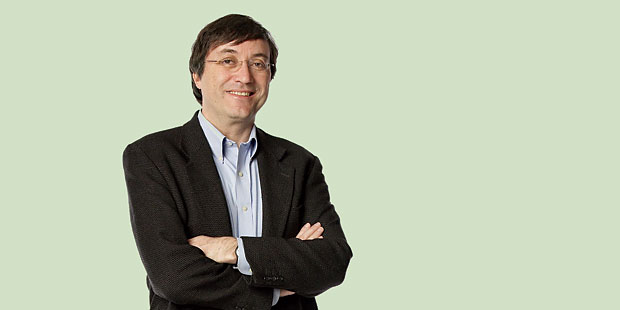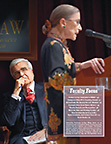Introducing Moshe Halbertal
Gruss Professor of Law
Printer Friendly VersionBurt Neuborne calls Moshe Halbertal “the star of the Monday meetings.” At these weekly faculty gatherings, a professor presents a working paper; it’s an opportunity to receive feedback and share expertise with fellow scholars. Halbertal always stands out for not only having read the week’s paper but being among the first to ask questions. “He taught me how to behave on Mondays: I time my question carefully so that I have raised my hand early but get called on after Moshe,” says Neuborne, tongue-in-cheek. “Then I say, ‘Never mind, Moshe has already asked my question.’”
Halbertal, a global visiting professor of law and Gruss Visiting Professor of Law since 2003, joins the faculty as the tenured Gruss Professor of Law this fall. He will continue his practice of spending the spring semester in Israel, where he is a professor of Jewish thought and philosophy at Hebrew University. At NYU, he teaches Jewish Law and Legal Theory and the Ethics of Obligation in Jewish Law. Though he doesn’t have a J.D., he has become, through his careful readings of others’ work and long philosophical discussions, “indispensable to so many of us on the faculty,” says Amy Adler, who specializes in art law. Indeed, the news that Halbertal secured a permanent position on the faculty prompted an outpouring of unusually gushy praise, with colleagues calling him “beloved,” “a dear man,” and “joyful and soulful.”
Halbertal’s extraordinary dedication and generosity may be the result of lessons learned from his father. Born in Montevideo, Uruguay, he grew up trilingual. His father, Meir, spoke Yiddish, his mother, Henya, was fluent in Hebrew, and both also spoke Spanish. A Jew born in Poland, Meir survived the Holocaust by fleeing to Russia. While much of his family perished, he spent time in a Siberian gulag and an orphanage, and escaped pogroms by joining distant relatives in Uruguay. There he met and married Henya, an elementary school teacher. They had two sons, Moshe and Dov, and moved to Jerusalem when Moshe was eight years old. Halbertal remembers his father, the educational director of a high school who died in his early 70s in 2001, as an optimistic person who taught him the power of gratitude and giving. “When I asked him how he came from there without being broken,” says Halbertal, “he said, ‘Whenever I was in distress, I saw someone in far more distress and gave help to him.’” Both parents also instilled a deep respect for education. “My father’s formative years were all about survival,” Halbertal says. “He wanted his children to have the gift of what he missed, the gift to study and grow, so in some ways, we were the children who fulfilled whatever he hadn’t had.”
Halbertal received a strong, Talmudic education in yeshiva, an Orthodox Jewish rabbinical seminary, and then attended Hebrew University, where he earned a B.A. and a Ph.D. in Jewish thought and philosophy. His work began to focus on the intersection of Jewish law and philosophy when he noticed a “constructive tension,” namely the question, “What is the role of value in adjudicating between possibilities?” For example, Halbertal notes that a saying such as “an eye for an eye” can be read in two plausible ways: the semantic, where one would actually demand an actual eye in retribution, and the moral, where one would accept monetary compensation and consider the eye a metaphor. Through such analysis, “you see the role that values play in the interpretive process,” says Halbertal.
One of Halbertal’s most notable works is the 1997 book People of the Book: Canon, Meaning and Authority (Harvard University Press), in which he applied his deep knowledge of religious thought to modern questions. “Part of Halbertal’s gift is that he manages to reveal how much the struggles within Jewish thought resonate with ongoing struggles in law, literature and politics today,” says Richard Pildes, Sudler Family Professor of Constitutional Law. Pildes cites current debates over the role of the Constitution in American law and culture, the proper methods of constitutional interpretation or the legitimate space for dissent from rulings of the Supreme Court as subject to illumination through Halbertal’s exposure of the centuries-long turmoil over surprisingly similar issues within the traditions of Jewish religious thought.
In 2001, Halbertal was appointed by a committee established by the Israeli Joint Chiefs of Staff to contribute to the drafting of the ethics code for the Israeli Army. Given the importance to Israel of its military, creating any restrictions on military might was a delicate operation. However, the ultimate product, says Yishai Beer, professor of law at Hebrew University, “was a masterpiece.”
More recently, Halbertal was the guest at the Colloquium in Legal, Political and Social Philosophy—known for convening some of the most incisive, even ruthless, intellectuals and philosophers for a thorough dissection of papers-in-process. Halbertal’s paper, “Self-Transcendence, Violence and the Political Order,” examines the suicide bomber and the terrorist who doesn’t try to escape punishment because he wants to prove that the aim was worth risking his life. Halbertal claims that this kind of sacrificial transcendence is morally misguided. Legitimate moral demands may, in some cases, require sacrifice, but sacrifice can never legitimize action that would not otherwise be legitimate. Thomas Nagel, who leads the colloquium along with Ronald Dworkin, says Halbertal’s argument boils down to, “If violent action is right, it’s right without sacrifice. If it’s wrong, sacrifice won’t make it right” and described the paper as a “lucid and original discussion of self-transcendence and its pathologies.”
Living and teaching across an ocean and a continent can take its toll. But true to form, Halbertal, who is divorced and the father of three daughters, focuses on the positive. Living in two nations, he says, is “a gift” that confers the ability to be comfortable among different people and in different situations, and he is especially grateful to share that with his children. “We have a sense of the world not being a small place, which is a good thing,” Halbertal says. “There is empowerment in exploring and seeing and contributing.”
—


 Multimedia
Multimedia